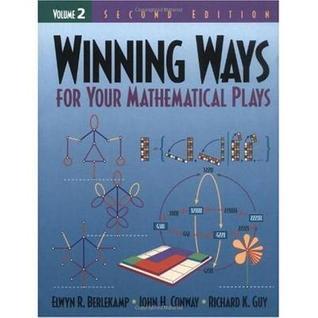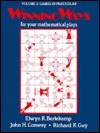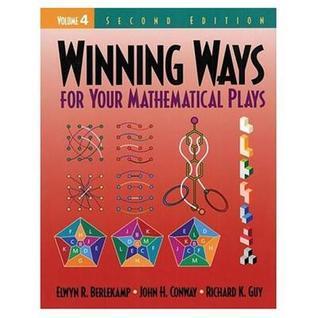


Winning Ways for Your Mathematical Plays
Series · 5 books · 1982-1997
Books in series

#1
Winning Ways for Your Mathematical Plays
1982
This classic on games and how to play them intelligently is being re\-issued in a new, four volume edition. This book has laid the foundation to a mathematical approach to playing games. The wise authors wield witty words, which wangle wonderfully winning ways. In Volume 1, the authors do the Spade Work, presenting theories and techniques to "dissect" games of varied structures and formats in order to develop winning strategies.

#2
Winning Ways for Your Mathematical Plays, Vol. 2
1997
In the quarter of a century since three mathematicians and game theorists collaborated to create Winning Ways for Your Mathematical Plays, the book has become the definitive work on the subject of mathematical games. Now carefully revised and broken down into four volumes to accommodate new developments, the Second Edition retains the original's wealth of wit and wisdom. The authors' insightful strategies, blended with their witty and irreverent style, make reading a profitable pleasure. In Volume 2, the authors have a Change of Heart, bending the rules established in Volume 1 to apply them to games such as Cut\-cake and Loopy Hackenbush. From the Table of Contents: \- If You Can't Beat 'Em, Join 'Em! \- Hot Bottles Followed by Cold Wars \- Games Infinite and Indefinite \- Games Eternal\-\-Games Entailed \- Survival in the Lost World

#2
Winning Ways for your mathematical plays. Volume 2
Games in Particular
1982
Winning Ways includes several theories for a wide range of different compounds which are described in detail in the first volume, Games in General. In this volume, Games in Particular, there is a dazzling presentation of the any game which presents an opportunity for witty and original comment has been included. The analyses start with basic theory using simple examples, but progress to detailed case-studies of well-known games ranging from the elementary to the elaborate and including Tic-Tac-Toe, Dots-and-Boxes, Hackenbush, Peg Solitaire and the maddening Hungarian cube puzzle.
#3
Winning Ways for Your Mathematical Plays, Volume 3
1986
In the quarter of a century since three mathematicians and game theorists collaborated to create Winning Ways for Your Mathematical Plays, the book has become the definitive work on the subject of mathematical games. Now carefully revised and broken down into four volumes to accommodate new developments, the Second Edition retains the original's wealth of wit and wisdom. The authors' insightful strategies, blended with their witty and irreverent style, make reading a profitable pleasure. In Volume 3, the authors examine Games played in Clubs, giving case studies for coin and paper\-and\-pencil games, such as Dots\-and\-Boxes and Nimstring. From the Table of \- Turn and Turn About \- Chips and Strips \- Dots\-and\-Boxes \- Spots and Sprouts \- The Emperor and His Money \- The King and the Consumer \- Fox and Geese; Hare and Hounds \- Lines and Squares

#4
Winning Ways for Your Mathematical Plays, volume 4
1985
In the quarter of a century since three mathematicians and game theorists collaborated to create Winning Ways for Your Mathematical Plays, the book has become the definitive work on the subject of mathematical games. Now carefully revised and broken down into four volumes to accommodate new developments, the Second Edition retains the original's wealth of wit and wisdom. The authors' insightful strategies, blended with their witty and irreverent style, make reading a profitable pleasure. In Volume 4, the authors present a Diamond of a find, covering one\-player games such as Solitaire.
Authors

John H. Conway
Author · 7 books
John Horton Conway, often credited as John H. Conway, was a Professor of Mathematics at Princeton University, known for inventing the "Game of Life."
Elwyn R. Berlekamp
Author · 8 books
Elwyn Ralph Berlekamp was a professor emeritus of mathematics and Electrical Engineering and Computer Science at the University of California, Berkeley. He was known for his work in information theory and combinatorial game theory.